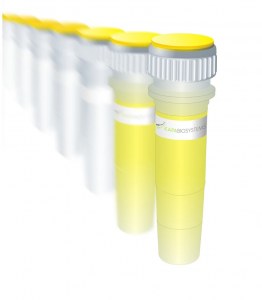General Protocol

KAPA2G Fast PCR Kit Protocol
KAPA2G Fast ReadyMix Protocol
KAPA2G Fast HotStart Protocol
KAPA2G HotStart ReadyMix Protocol
KAPA2G Fast Products
KAPA2G Fast DNA Polymerase is a second-generation (2G) enzyme derived through a process of molecular evolution. The polymerase was engineered for higher processivity and speed, offering significantly faster extension rates than wild-type Taq polymerase. In addition to speed, KAPA2G Fast provides higher yields and sensitivity than competitor enzymes across a broad range of targets.
Apllications
Any existing PCR assay performed efficiently with wild-type Taq polymerase may be converted to a Fast PCR assay with KAPA2G Fast DNA Polymerase. Typically, very little re-optimization of reaction parameters is required. Fast PCR assays with KAPA2G Fast may be performed with any conventional Peltier-based thermocycler and thin-walled PCR tubes or plates.
Conversion to Fast PCR is not recommended for assays that do not yield optimal results with wild-type Taq such as:
- Amplification of long fragments (>1 kb) from low target copy numbers.
- PCR assays involving primers that are prone to non-specific amplification (even after reaction optimization).
- Complex PCR assays, e.g. Multiplex PCRs or assays involving the incorporation of nucleotide analogs.
- Optimized assays that give low yields of the desired amplicon despite a high target copy number (e.g. amplification from difficult templates or templates containing PCR inhibitors or low sensitivity assays requiring a polymerase blend).
Although it is possible to convert such assays to Fast PCR assays, significant reaction optimization is likely to be required
1.Reaction Setup
| Component | Final Concentration | 25 µl Reaction |
| PCR Water | Ajuster à 25 µl | |
| Forward Primer (10 μM) | 0.5 μM | 1.25 μl |
| Reverse Primer (10 μM) | 0.5 μM | 1.25 μl |
| 5X KAPA2G Buffer A | 1X | 5.0 µl |
| MgCl2 (25 mM) | 1.5 mM | 0.5 µl |
| dNTP Mix (10 mM each) | 0.2 mM each | 0.5 µl |
| DMSO (for amplicons with a GC content >60%) | 5.0 - 7.5% | 1.25 - 1.875 µl |
| Template DNA | As required | ≤ 100 ng for genomic DNA ≤ 10 ng for less complex DNA(e.g. plasmid, lambda) |
| KAPA2G Fast DNA Polymerase (5 U/µl) | 0.5 U/ 25 µl | 0.10 µl |
2. Cycling Parameters
| Step |
Time and Temperature | Cycles |
| Initial denaturation | 1-3 min at 95ºC | 1 |
| Denaturation | 10 sec at 95ºC | 25-40 |
| Annealing | 10 sec at optimal Th | |
| Extension | 1 sec at 72 °C for amplicons <1 kb, 15 sec/kb at 72 °C for >1 – 5 kb amplicons | |
| Final extension | 1-10 min/kb at 72ºC | 1 |
| Hold | 4-10°C | 1 |
3. Products
| Description |
Size |
Catalog# |
| KAPA 2G Fast PCR Kits with dNTP | 100 U | KK5008 |
| 250 U | KK5009 | |
| KAPA 2G Fast PCR Kits without dNTP | 100 U | KK5020 |
| 250 U | KK5021 | |
| KAPA 2G Fast readymix + Dye | 100 rxn | KK5101 |
| 500 rxn | KK5102 | |
| KAPA 2G Fast HotStart PCR Kits with dNTP | 100 U | KK5530 |
| 250 U | KK5502 | |
| 500 U | KK5500 | |
| KAPA 2G Fast HotStart PCR Kits without dNTP | 100 U | KK5523 |
| 250 U | KK5503 | |
| 500 U | KK5501 | |
| 2 500 U | KK5519 | |
| KAPA 2G Fast HotStart PCR Kits without dNTP with Mg free buffer | 250 U | KK5512 |
| 500 U | KK5510 | |
| KAPA 2G Fast HotStart PCR Kits without dNTP without Mg free buffer | 250 U | KK5513 |
| 500 U | KK5511 | |
| KAPA 2G Fast HotStart Readymix PCR Kits | 100 rxn | KK5603 |
| 500 rxn | KK5601 | |
| KAPA 2G Fast HotStart Readymix with Dye | 100 rxn | KK5608 |
| 500 rxn | KK5609 |
4. Résultats
 |
| Amplification of 5 human gene fragments using KAPA2G Fast HotStart or competitor hot start Taq formulations. Reactions (25 µl) contained 5 ng human genomic DNA and 0.5 units (KAPA2G Fast HotStart or Competitor I) or 0.625 units (Competitor A or Competitor Q) enzyme. For amplicons with a GC content >65%(#2 and 3), 7.5%DMSO was included in reaction mixes. Cycling was performed on an EppendorfMastercyclerepgradient S, using 3-step cycling profiles (35 cycles) with 15 sec denaturation (95ºC) and 15 sec annealing (60ºC) per cycle for all enzymes. Extension (72ºC) was 1 sec per cycle for KAPA2G Fast HotStart and 60 sec per cycle for competitor enzymes. Initial denaturation/enzyme re-activation and final extension times used for each enzyme were as per the manufacturers recommendations. The total reaction time for each enzyme is as indicated. |

